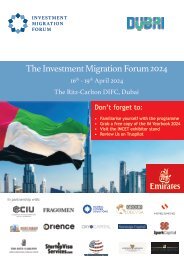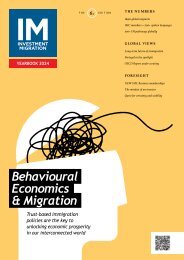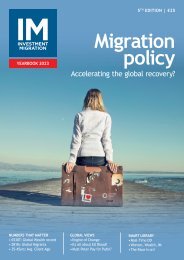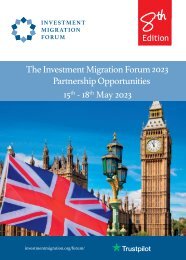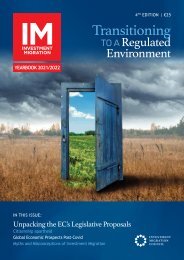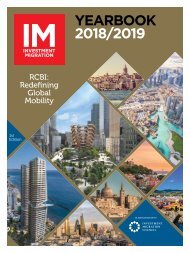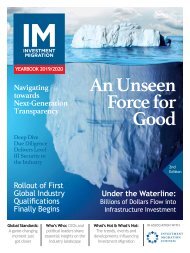IM Yearbook 2020/21
Born from the need for a global, credible, “go-to” publication, the 3rd IM Yearbook offers valuable access to a prime target audience of top industry influencers, decision makers, and the foremost referral network to the world’s most influential Investment Migration programmes: Government officials such as Heads of CIU’s, policy makers, academics, migration agents, law firms, wealth managers, financial advisors, real estate developers, and international firms involved in investment migration.
Born from the need for a global, credible, “go-to” publication, the 3rd IM Yearbook offers valuable access to a prime target audience of top industry influencers, decision makers, and the foremost referral network to the world’s most influential Investment Migration programmes: Government officials such as Heads of CIU’s, policy makers, academics, migration agents, law firms, wealth managers, financial advisors, real estate developers, and international firms involved in investment migration.
You also want an ePaper? Increase the reach of your titles
YUMPU automatically turns print PDFs into web optimized ePapers that Google loves.
Economic Impact<br />
Economically, Seixas continues, real estate projects linked to<br />
investment migration can have an enormous impact. “These<br />
programmes often bring in important financial aid required<br />
to rehabilitate communities and entire city centres. Then<br />
there is the job-creation aspect. Here we need to look at both<br />
the job creation as part of the construction and development<br />
of a project, but when it comes to bigger projects, such as<br />
hotels, we also need to take into consideration the jobs that<br />
are created once these projects are up and running.”<br />
Trisokkas agrees saying that “these programmes can possibly<br />
provide a series of significant liquidity injections into an<br />
economy and create paths for strategic investments that assist<br />
with the modernisation and diversification of smaller nations’<br />
economies, creating a better life for their citizens”. Gaye<br />
Hechme highlights that real estate projects are also a source<br />
of government revenue creating income in the form of taxes,<br />
duties and fees related to the operations of the project.<br />
Unbalanced Growth<br />
Critics of real estate-linked investment migration options<br />
often argue that they can lead to one-sided economic<br />
growth and negatively affect the property market by<br />
pushing up prices so that housing becomes unaffordable<br />
for the local population with modest and middle-income<br />
levels. “This can happen,” says Seixas. “That’s why it’s<br />
very important that local authorities are very attentive<br />
in legislating appropriate bills in order to minimise this<br />
effect, although a higher demand will always impact<br />
the pricing of real estate no matter whether it’s related<br />
or unrelated to the investment migration,” he says.<br />
“If the country does not structure the real estate route<br />
correctly, then it might have a negative impact,” Trisokkas’<br />
admits. “There is definitely a greater need to structure<br />
long-term strategies for the real estate route so that local<br />
communities enjoy the benefits of these foreign direct<br />
investment inflows.” He believes countries should structure<br />
their programmes “in a way that motivates applicants to<br />
invest in less developed areas, for example away from the<br />
city centres or prime locations, so that these areas see a fresh<br />
injection of capital”. Moreover, he says, investment migration<br />
programmes have a vast potential and could further assist<br />
with the creation of a new branded touristic product and,<br />
at the same time, upgrade the existing infrastructure.<br />
For Cameron Fraser Antigua and Barbuda demonstrates<br />
that this strategy can work. “Antigua required from the<br />
start that all CBI real estate projects need to be within<br />
clearly defined development zones that have primarily<br />
been set aside for the development of hotel room stock.<br />
This policy has been successful and has seen a significant<br />
increase in the number of hotel beds in Antigua funded<br />
by CBI real estate investments. If this policy is maintained,<br />
we believe that some of the issues that have become<br />
apparent in other markets will be avoided,” he points out.<br />
84<br />
Investment Migration <strong>Yearbook</strong> 2O2O/2O<strong>21</strong>




